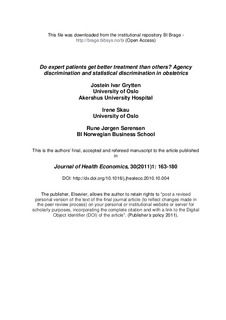Do expert patients get better treatment than others? Agency discrimination and statistical discrimination in obstetrics
Journal article, Peer reviewed

View/
Date
2011Metadata
Show full item recordCollections
- Scientific articles [2181]
Original version
Journal of Health Economics, 30(2011)1: 163-180 http://dx.doi.org/10.1016/j.jhealeco.2010.10.004Abstract
We address models that can explain why expert patients (obstetricians, midwives and doctors) are treated better than non-experts (mainly non-medical training). Models of statistical discrimination show that benevolent doctors treat expert patients better, since experts are better at communicating with the doctor. Agency theory suggests that doctors have an incentive to limit hospital costs by distorting information to non-expert patients, but not to expert patients.
The hypotheses were tested on a large set of data, which contained information about the highest education of the parents, and detailed medical information about all births in Norway during the period 1967 to 2005 (Medical Birth Registry). The empirical analyses show that expert parents have a higher rate of Caesarean section than non-expert parents. The educational disparities were considerable 40 years ago, but have become markedly less over time. The analyses provide support for statistical discrimination theory, though agency theory cannot be totally excluded.
Description
This is the authors’ final, accepted and refereed manuscript to the article